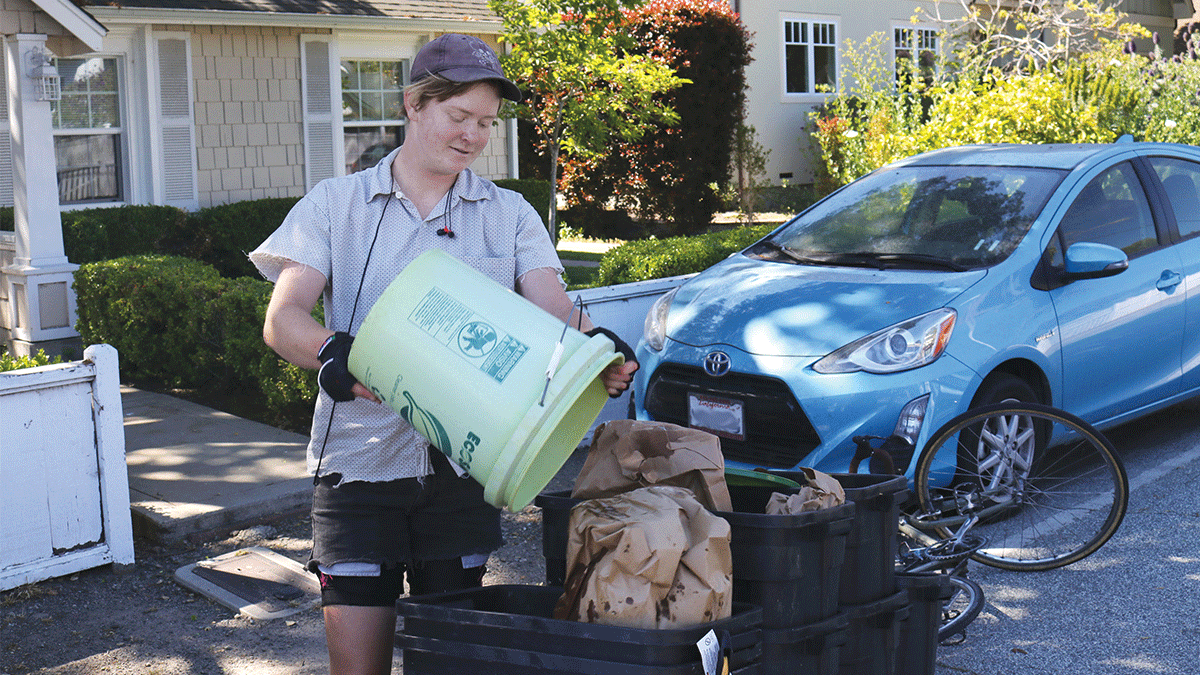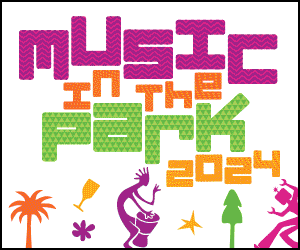Addison Wilks, an owner of the Hard-Core Compost cooperative, has developed a unique passion. That passion is for cycling around town picking up food scraps, composting them, and turning them into healthy soil that can be reused in the future.
Wilks and seven cyclist friends bought Santa Cruz Composting Co. from founder Ivy Young early this year. Young fell behind on pick-ups and running the rest of her operation after suffering a wrist injury on the job, and then undergoing a surprisingly complicated surgery last year. “Being a mom and keeping the business going was not going to happen,” Young says. “I ultimately decided to end the service. It was heartbreaking.”
The Hard-Core crew has picked up where Young left off, cycling around the county with large bins in tow to pick up food waste from households that don’t have the energy, space or hours to compost it themselves. “We do it because we can,” says Wilks, one of Young’s former employees. “And we all love bikes!”
When a small office space opened up right next to Ped-Ex at the Hub for Sustainable Living in downtown Santa Cruz, Wilks and the other soon-to-be compost entrepreneurs took that as a sign. “That in itself pushed us and motivated us to get our shit together,” Wilks says.
It took a few weeks, but they came up with the $8,000 needed to re-launch Young’s business as a new cooperatively owned company. Young gave the team three months to pay, hooking the new owners up with a drop-off truck, three bike trailers, compost sifters, shovels, and almost 500 green 5-gallon buckets in the process.
“I negotiated with them—tallying up how much the equipment was worth and adding a little more for the customer list. It was not a profiteering kind of move,” says Young. “I was going to have to sell the truck, trailers and assorted equipment anyways. We eventually signed a contract we were both happy with.”
Hard-Core’s coverage area stretches from Westside Santa Cruz to portions of Capitola, and subscriptions start at $25 a month. The new business owners—overseeing what is still Santa Cruz County’s only composting service—are running things the same way Young did, but with more riders and a more balanced, sustainable workload. Riders work no more than two days a week. The food waste often goes to the Homeless Garden Project, while customers get a perfectly clean bucket returned to them to start collecting their next round of food waste.
SOIL AND TROUBLE
In 2013, Americans sent 254 million tons of garbage to landfills, according to the Environmental Protection Agency. The U.S. Department of Agriculture has estimated that 30-40% of the food supply gets wasted, coming out to more than 20 pounds per person per month.
Local governments across California have for years collected yard trimmings, which get turned into compost. A few, like San Francisco, also collect food scraps for composting.
Composting creates soil for local farmers, growers and households, and absorbs carbon dioxide from the atmosphere. On top of that, the process stops unneeded waste from entering landfills, where it would otherwise release methane—a greenhouse gas 30-80 times more dangerous than CO2.
In order to implement the state’s carbon-reduction goals, CalRecycle has mandated that curbside collection of food waste for all California residents must be implemented by Jan. 1, 2022.
Santa Cruz County Zero Waste Programs Manager Tim Goncharoff says he expects Santa Cruz County to meet its goal. County officials have identified a compost site at the Buena Vista Landfill, about 1.5 miles from the Watsonville Airport, and are in the process of design and permitting work at the location, he says. The site would need to clear seven state and federal agencies in order to get approval.
Many areas, including Santa Cruz County, already have programs to collect food waste from businesses, as required by the state.
Today, Santa Cruz County’s food waste goes to the Monterey Regional Waste Management District for processing. Establishing a composting facility within county lines would further reduce greenhouse gas emissions by cutting down the number of miles waste is transported. It would also allow farmers and gardeners to pick up fresh batches of local fertilizer for their own use.
“The best approach,” writes Goncharoff, “is to close the loop locally by using organic waste to generate compost to re-apply to the soil, allowing farmers, gardeners, vintners and others to restore nutrients to the soil, conserve water, and sequester carbon.”
Janice Bisgaard, a spokesperson for the city of Santa Cruz’s Public Works department, told GT in December that the city was on schedule to roll out curbside pick-up for compostable food scraps by 2022, and to grow its own composting program for businesses in the meantime. The city is working on where to best locate facilities for its composting expansion. For now, the city’s sending compostable food waste to a Santa Clara facility.
Bisgaard says that a planned installation of pre-processing equipment at the city’s Dimeo Lane landfill has been pushed back from May to the fall.
DIRTY WORK
Young is pulling for the Hard-Core crew, but with the comfort of knowing that the sale of her business is in the rear-view mirror. The 2019 holidays were rough on her as she dealt with nagging injury, a constant cycle of self-doubt and the pressures of being a mom without a job.
“I really want them to succeed, to keep my dream going,” Young says. “I also want them to do their own thing.”
At the end of the day, the force motivating Wilks and the other Hard-Core owners is the same thing that drove Young: a deep passion for environmental stewardship.
With Young’s company, however, customers could request compost from her, and she would deliver it to them at the end of each month. Hard-Core is still trying to work this process out, with the team brainstorming ways to provide deliveries in the future.
“This isn’t a deal-breaker for most people,” says Wilks. “The majority of people simply don’t want to throw away their food scraps. A lot of people just like doing good for the Earth.”
For more information on Hard-Core Compost, visit compost.bike.














